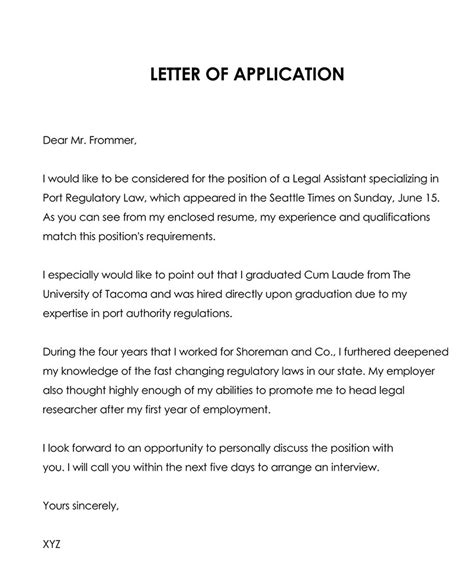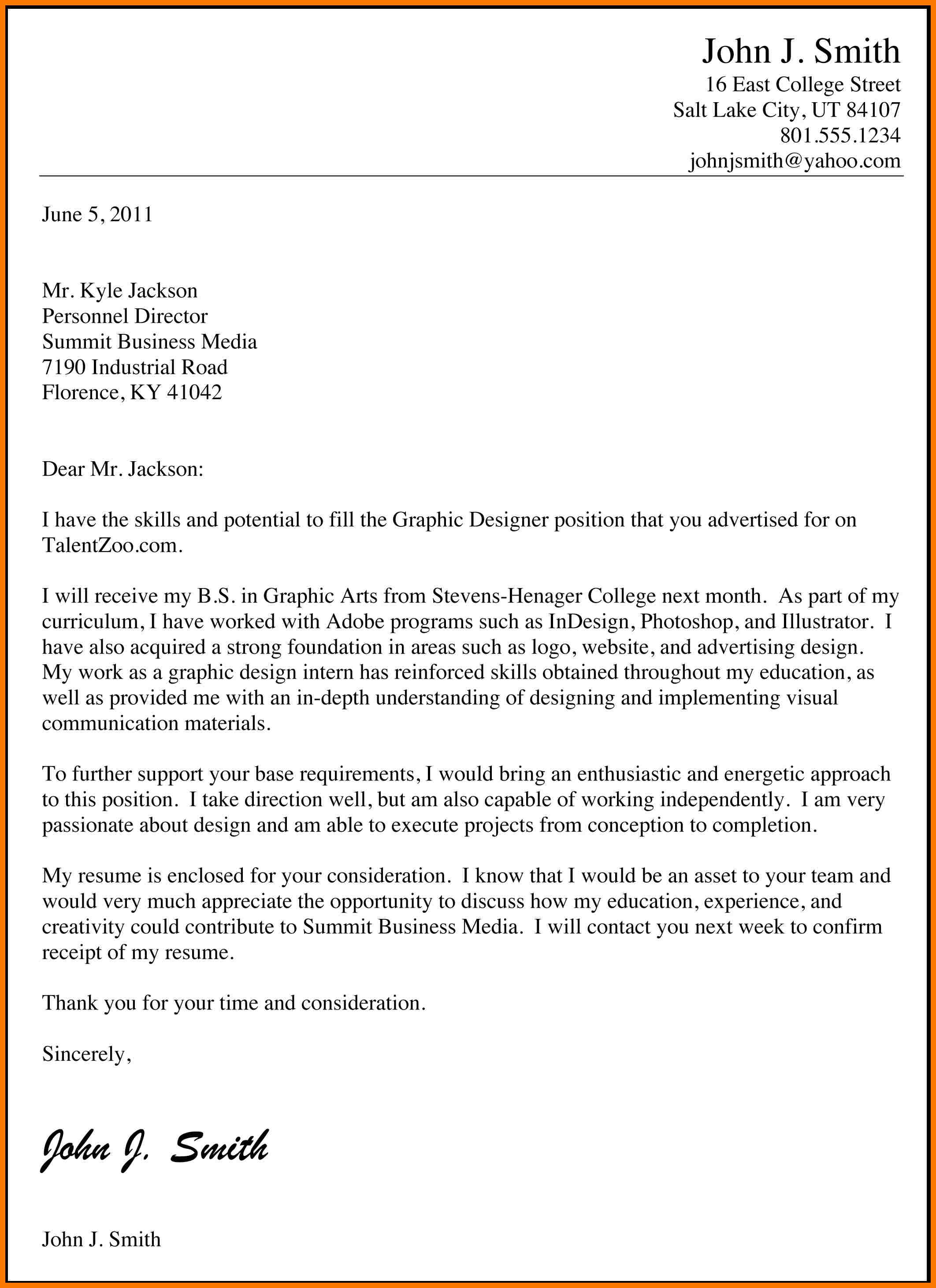How To Create A Job Application Letter

Crafting an effective job application letter is a crucial step in the job search process. It is your opportunity to introduce yourself to potential employers and make a positive first impression. A well-written application letter can set you apart from other candidates and showcase your unique qualifications and skills. In this comprehensive guide, we will delve into the art of creating a compelling job application letter, covering various aspects that will help you stand out and increase your chances of securing an interview.
Understanding the Purpose of an Application Letter

An application letter, also known as a cover letter, serves as a companion to your resume or curriculum vitae. While your resume provides a detailed overview of your professional background, the application letter allows you to personalize your introduction and highlight why you are an ideal fit for the specific role and organization. It is a chance to demonstrate your enthusiasm, align your skills with the job requirements, and provide context to your qualifications.
Consider your application letter as a marketing tool. It should effectively communicate your value proposition and persuade the hiring manager to invite you for an interview. By tailoring your letter to each job opportunity, you demonstrate your commitment to the position and showcase your understanding of the company's needs.
Researching the Company and Role

Before sitting down to write your application letter, it is essential to conduct thorough research on the company and the role you are applying for. Understanding the organization’s mission, values, and recent achievements will enable you to align your skills and experiences with their goals. Here are some key aspects to focus on during your research:
- Company Overview: Visit the company's website, read about their history, products or services, and recent news. Understand their unique selling points and the industry they operate in.
- Job Description: Analyze the job posting carefully. Pay attention to the required skills, qualifications, and responsibilities. Identify the key challenges and opportunities associated with the role.
- Industry Trends: Stay updated on the latest trends and developments in the industry. This knowledge will demonstrate your proactive approach and passion for staying current.
- Competitors and Market Position: Research the company's competitors and their market position. Understanding the competitive landscape will help you highlight your ability to contribute to the company's success.
By conducting comprehensive research, you can identify the company's pain points and how your skills and experiences can address them. This insight will guide you in creating a targeted and persuasive application letter.
Formatting and Structure
A well-formatted and structured application letter is essential to make a professional impression. Here are some guidelines to follow:
- Header: Include your contact information, such as your full name, address, phone number, and email address. Ensure that your email address is professional and appropriate.
- Date: Mention the date you are sending the letter. This provides context and helps the hiring manager keep track of applications.
- Recipient's Information: Address the letter to a specific person, if possible. If the hiring manager's name is not available, you can address it to "Hiring Manager" or "Recruitment Team."
- Subject Line: Craft a concise and compelling subject line that grabs the reader's attention. Include the job title and a brief description of your qualifications or the value you bring.
- Body: Divide your letter into paragraphs for better readability. Generally, a cover letter should have three main sections: introduction, body, and conclusion.
Introduction
Begin your letter with a strong introduction that captures the reader's interest. Mention how you learned about the job opportunity and express your enthusiasm for the role. Briefly highlight your relevant qualifications and why you are a strong candidate.
Body
The body of your letter is where you showcase your skills and experiences. Use this section to align your qualifications with the job requirements. Discuss your key achievements, relevant projects, or experiences that demonstrate your ability to succeed in the role. Provide specific examples and quantify your accomplishments whenever possible.
Consider using bullet points or short paragraphs to make your letter more scannable. This format helps hiring managers quickly identify the key points and makes your letter more visually appealing.
Conclusion
In the conclusion, reiterate your interest in the position and express your eagerness to contribute to the company's success. End your letter with a call to action, such as inviting the hiring manager to contact you for further discussion or providing your availability for an interview.
Tailoring Your Letter to the Job
One of the most critical aspects of creating an effective application letter is tailoring it to the specific job you are applying for. Each job opportunity is unique, and tailoring your letter demonstrates your dedication and understanding of the company's needs.
Start by reviewing the job description and identifying the key skills, qualifications, and responsibilities mentioned. Use these as a guide to highlight your relevant experiences and qualifications. Avoid generic statements and instead provide specific examples that showcase how your skills align with the job requirements.
For instance, if the job description emphasizes strong communication skills, mention a specific project where you effectively communicated complex ideas to a diverse audience. If teamwork is a crucial aspect, discuss a team-based accomplishment and your role within it.
Tailoring your letter not only demonstrates your attention to detail but also allows you to showcase your understanding of the company's culture and expectations.
Highlighting Transferable Skills

Even if you do not have direct experience in the industry or role, you can still highlight your transferable skills and experiences. Transferable skills are abilities that can be applied across different industries or roles. By identifying and emphasizing these skills, you can demonstrate your adaptability and potential to succeed in the new role.
For example, if you are transitioning from a customer service role to a sales position, you can highlight your excellent communication and relationship-building skills. Similarly, if you have project management experience, you can emphasize your ability to organize and lead teams, even if the new role is in a different field.
Identify your transferable skills and provide concrete examples of how you have successfully utilized them in the past. This approach can help bridge the gap between your current and desired career paths.
Writing Style and Tone
Your application letter should reflect your professional personality and tone. Here are some tips to ensure your writing style is appropriate:
- Use Active Voice: Write in active voice to make your letter more engaging and direct. For example, "I developed a comprehensive marketing strategy" is more impactful than "A comprehensive marketing strategy was developed."
- Avoid Jargon: While it is essential to demonstrate your industry knowledge, avoid using excessive jargon or technical terms that may be unfamiliar to the hiring manager. Strive for clarity and simplicity.
- Be Concise: Keep your letter concise and to the point. Aim for one page, focusing on the most relevant and compelling information. Avoid unnecessary details or rambling.
- Use Personal Pronouns: Using personal pronouns like "I" and "my" adds a personal touch to your letter. It helps establish a connection with the reader and showcases your authenticity.
Proofreading and Editing
Before submitting your application letter, it is crucial to proofread and edit your work. Typos, grammatical errors, and formatting issues can detract from your professionalism and impact your chances of being considered for the role.
Here are some proofreading tips:
- Read your letter aloud to catch any awkward phrasing or unclear sentences.
- Use grammar and spell-check tools, but remember that they may not catch all errors.
- Have a friend or colleague review your letter for any errors or areas that could be improved.
- Ensure consistency in formatting, font, and style throughout your letter.
Remember, a well-proofread and edited letter demonstrates your attention to detail and commitment to excellence.
Follow-Up and Persistence
After submitting your application letter and resume, it is essential to follow up with the hiring manager or recruiter. A polite and professional follow-up email or phone call can help keep your application fresh in their minds. It demonstrates your interest and enthusiasm for the role.
However, be mindful of the timing and frequency of your follow-ups. Allow enough time for the hiring process to progress, and avoid excessive contact that may come across as pushy.
Persistence is key, but balance it with patience and professionalism. Stay positive and continue your job search journey, even if you do not receive an immediate response.
Sample Application Letter
To provide a practical example, here is a sample application letter for a Marketing Manager position at a tech startup:
Subject: Application for Marketing Manager Role at [Startup Name]
Dear Hiring Manager,
I am thrilled to submit my application for the Marketing Manager position at [Startup Name]. As a passionate marketer with a proven track record of driving successful campaigns, I am confident that my skills and experiences align perfectly with your company's dynamic and innovative culture.
With a deep understanding of the tech industry and a keen eye for digital marketing trends, I have consistently delivered outstanding results. My expertise lies in developing comprehensive marketing strategies that engage target audiences and drive tangible business outcomes.
During my previous role at [Company Name], I led a team of marketers in creating and executing a groundbreaking social media campaign. This campaign not only increased brand awareness by 30% but also resulted in a 25% boost in sales, demonstrating my ability to deliver impactful results.
Furthermore, my strong analytical skills and data-driven approach have enabled me to optimize marketing efforts and make informed decisions. I am proficient in utilizing various marketing tools and platforms, ensuring that my campaigns are not only creative but also highly targeted and effective.
The opportunity to join [Startup Name] and contribute to your rapid growth excites me immensely. I am confident that my skills, coupled with your company's innovative mindset, will create a powerful synergy. I am eager to discuss how my expertise can align with your marketing goals and drive your brand to new heights.
Thank you for considering my application. I am available for an interview at your convenience and look forward to the possibility of joining your dynamic team.
Best regards,
[Your Name]
Contact Information
Conclusion
Crafting a compelling job application letter is an art that requires careful planning, research, and personalization. By following the guidelines outlined in this guide, you can create an application letter that showcases your unique value and increases your chances of landing an interview. Remember, a well-written letter is a powerful tool to make a lasting impression and open doors to exciting career opportunities.
What should I include in my application letter if I have limited work experience?
+If you have limited work experience, focus on your transferable skills and any relevant projects or accomplishments. Highlight your academic achievements, internships, or volunteer work that demonstrate your potential. Emphasize your enthusiasm for the role and your willingness to learn and grow.
Should I include my salary expectations in the application letter?
+It is generally not recommended to include salary expectations in your application letter. Instead, address salary negotiations during the interview stage, where you can provide a more detailed understanding of your value and the market rate for the role.
How long should my application letter be?
+An application letter should ideally be one page long. Focus on providing concise and impactful information. Avoid unnecessary details and aim to keep the letter scannable and engaging.


